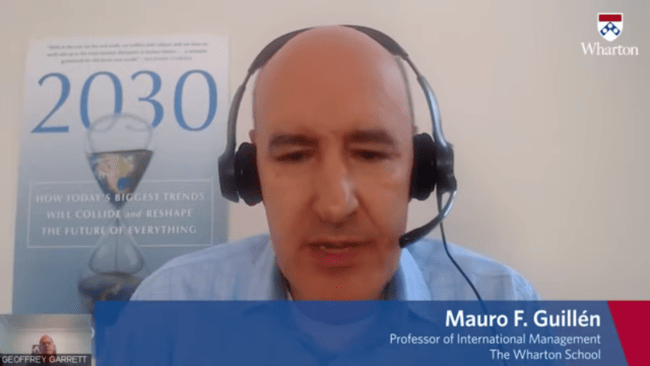
It can seem impossible to make sense of the complex global dynamics that have materialized as a result of the coronavirus pandemic. To help students navigate them, Wharton faculty quickly mobilized this spring to present real-time, actionable insights through a course titled Epidemics, Natural Disasters, and Geopolitics: Managing Global Business and Financial Uncertainty. “The whole point was to create a forum for learning about the implications of something that we will remember for the rest of our lives,” says management professor Mauro Guillén, who organized the virtual, six-week course that would become Wharton’s largest ever, with more than 2,400 students.
The first-of-its-kind class covered everything from rethinking supply chains to managing emotions during a global crisis. Supplementing the discussions were a range of resources handpicked by the more than dozen professors who led sessions. A selection of those materials — as well as video interviews with faculty and alumni — offer a window into the topics students explored.
“The Tears in the Deep Tiers”
Assigned by management professor John Paul MacDuffie and operations, information, and decisions professor Marshall Fisher, this European Business Review article explores vulnerabilities deep within complex supply chains. “One of the biggest long-term consequences of this crisis is how companies are going to restructure their supply chains,” says Guillén. “They’re not going to be as long geographically; they’re going to be more resilient and more diversified.” Authored by MIT professor Yossi Sheffi, the piece also provides concrete actions companies can take to stem those issues, such as mapping supply chains and partnering with industry associations to detect pain points.
“The Contagion We Can Control”
“When you have legitimate reason to worry, as we do now, you’re even more likely to be influenced by everyone else’s justifiable fear,” writes Wharton management professor Sigal Barsade in this Harvard Business Review piece. The phenomenon she describes is emotional contagion — the way people pass feelings to each other — and we often don’t realize it’s happening. But, Barsade writes, we can do something to prevent catching negative emotions from others, for example, by consulting reliable resources, practicing mindfulness, and actively working toward what she calls “good emotional hygiene.” Not only can being aware of emotions have a personal positive upside, but doing so also can help create better atmospheres within organizations at large.
“Take the Deal!”
This episode of the Choiceology podcast series hosted by operations, information, and decisions professor Katy Milkman explores how framing risk in uncertain situations can dramatically affect decisions. Produced last year before the coronavirus became a global problem, the episode even includes a hypothetical — yet now seemingly prescient — conversation about decision making in the face of a disease outbreak. “The way any choice is framed can have a meaningful impact on what you decide — for better or for worse,” says Milkman during the episode. In particular, she and her guests discuss how thinking in terms of what we stand to lose can cause people to make riskier bets, while thinking about what we have to gain can result in safer choices.
“The Coronavirus Could Reshape Global Order”
Complementing a session by Dean Geoffrey Garrett on China-U.S. relations, this Foreign Affairs piece makes the case that, in the absence of a global pandemic response from the U.S., China is moving to fill the gap. Authors Kurt Campbell and Rush Doshi argue that although China’s initial handling of the virus contributed to its spread, the country’s attempts since to squash it and provide aid in ways the U.S. hasn’t could ultimately change its influence on the world stage. “You could call it a COVID diplomacy, and it has been quite important in terms of accelerating the withdrawal of the U.S. and at the same time providing an opening for China,” says Guillén.
Coronavirus Course Discussions
For more on topics covered during the course, Wharton faculty and alumni participated in more than 30 one-on-one video conversations that, together, present a comprehensive set of insights on the virus’s economic and societal effects. The sessions span everything from finding happiness in the current environment to the impact on small businesses to testing efforts and the future of health care.

























